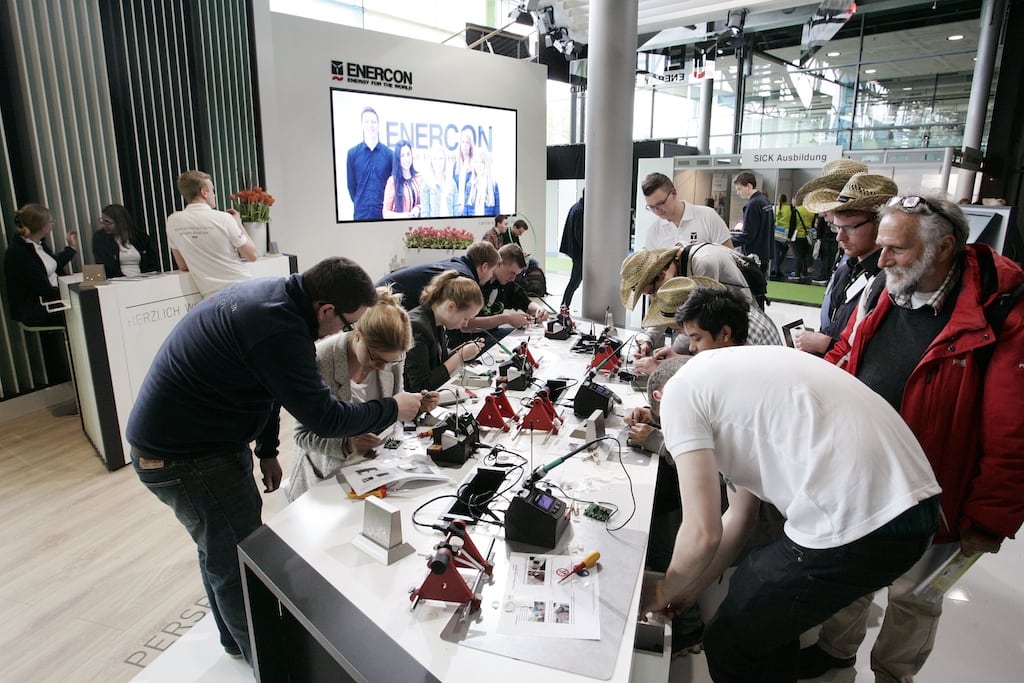Skift Take
Germany’s biggest exhibition will test the endurance of delegates as more than 200,000 visitors flock to Hanover. The event may be too big for the host city, and many delegates will have to commute for hours each day.
Can an event become too successful?
That’s something Germany’s largest exhibition organizer, Deutsche Messe, will put to the test in April when it combines two of its biggest events in Hanover, the Hannover Messe 2018 industrial technology show and the biannual CeMAT logistics and materials handling show.
The massive event will use 25 of the 26 halls and occupy around 4.3 million square feet of the world’s biggest exhibition center.
The annual combined trade show could attract more than 250,000 delegates, after the last standalone Hannover Messe notched a record 225,000 visitors last year and CeMAT 2016 drew more than 40,000.
Messe marketing and communications head Onuora Ogbukagu was more conservative in his estimate, expecting around 220,000 visitors. But even that number will present a challenge for a city with a population of just over 520,000 – and limited hotel supply.
Hanover’s hotels have been fully booked for the show for months already, as noted by Peter Röding, general manager of the Crowne Plaza Hannover.
“The combining of two global fairs has had a big impact locally, and we’re even seeing this extend to areas an hour outside the city by train,” said Röding.
Hanover hotels struggle to accommodate delegates to many events in the busy exhibition calendar, prompting the exhibition facility management to collaborate closely with Hannover Marketing & Tourism to help house visitors from around the globe.
Long before the arrival of Airbnb, local authorities launched an online private accommodation portal to link visitors with local residents with spare rooms. There are also several unofficial room rental providers. However, a couple of months out, there was almost no availability.
Despite its small size, Hanover has developed as Germany’s convention capital thanks to the growth of its main fairground and operator Deutsche Messe, which is a global player.
The exhibition tradition dates back to 1947, when the British military government in Allied-occupied Germany used abandoned aircraft hangars on the outskirts of Hanover for a trade fair after the traditional fairground of Leipzig fell into Soviet hands after the war. Its central location in Europe and an efficient transport infrastructure have ensured its continued popularity for major events.
Delegates are encouraged to stay elsewhere
Ogbukagu said delegates were encouraged to look beyond the city for accommodation options. Hanover is well-connected by highways and public transport to several towns and cities, and delegates are booking accommodation in neighboring Wolfsurg, Moinden, Celle and Bremen. For many, this will mean a commute of an hour or more to and from the exhibition each day.
Delegates from German cities such as Hamburg are expected to drive to the shows each day – a round trip that can take a couple of hours in each direction during peak times, even on the efficient autobahn. Others, from as far afield as Berlin, will brave close to two hours each way on the high-speed train if they can’t find accommodation closer to the event.
Handling the Crowds
While visitors, including a growing proportion of foreign delegates, may be inconvenienced by the commute, organizers are intent on enhancing the show experience, relying on technology to ensure efficiency and convenience.
Ogbukagu said the event organizer will have no difficulty hosting the expected delegate numbers, with most of the registrations now done online.
“Only around 5 percent of visitors come to the fairground without a ticket,” he said, while last-minute ticket sales are done at digital kiosks outside the gates.
Access via the five entrances is also automated and extremely efficient, he explained.
A parking navigator within the event app is a new technology this year. It will help delegates arriving by car to find vacant spots in the complex’s extensive parking areas, even assisting them by placing them close to the entrance nearest their chosen exhibitor.
Ogbukagu conceded that increased security concerns in Europe were weighing on the minds of some potential delegates, particularly in Asia. And with around 30 percent of delegates expected from outside of Germany, he stressed that the events company is working closely with police and security officials in the region.
Have a confidential tip for Skift? Get in touch
Tags: germany, meetings, tourism
Photo credit: As large events become more popular, organizers face the challenge of ensuring that spaces remain accessible to hundreds of thousands of attendees. Christian Behrens / Flickr
